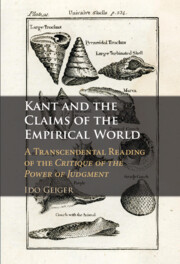 Kant and the Claims of the Empirical World
Kant and the Claims of the Empirical World Published online by Cambridge University Press: 30 April 2022
The concluding chapter sketches a portrait of Kant the empiricist and highlights what is of broader philosophical interest in it. Kant has a keen understanding that empirical knowledge is gradually acquired through a process of revision and refinement. Empirical knowledge is not an epistemic state but a process – not a possession but an ongoing pursuit. This follows from making a regulative assumption a necessary condition of empirical experience and knowledge. Furthermore, only the complete but unattainable determination of the sensibly given by a complete system of causally explanatory concepts can ground the objectivity and truth science seeks. Empirical truth too is ultimately an end we continuously pursue. Our claims to knowledge and our attempts at scientific explanation lay claim to being objectively true. But they are in principle open to revision, refinement or outright rejection. The chapter further claims that Kant’s conception of the aesthetic purposiveness of nature is an account of the acquisition of our most fundamental empirical concepts of observation, which also explains the fact that what we most fundamentally perceive are unchanging simple objects and their salient sensible properties. Finally, it shows that the aesthetic condition of experience does not prey to the "myth of the given."
To save this book to your Kindle, first ensure no-reply@cambridge.org is added to your Approved Personal Document E-mail List under your Personal Document Settings on the Manage Your Content and Devices page of your Amazon account. Then enter the ‘name’ part of your Kindle email address below. Find out more about saving to your Kindle.
Note you can select to save to either the @free.kindle.com or @kindle.com variations. ‘@free.kindle.com’ emails are free but can only be saved to your device when it is connected to wi-fi. ‘@kindle.com’ emails can be delivered even when you are not connected to wi-fi, but note that service fees apply.
Find out more about the Kindle Personal Document Service.
To save content items to your account, please confirm that you agree to abide by our usage policies. If this is the first time you use this feature, you will be asked to authorise Cambridge Core to connect with your account. Find out more about saving content to Dropbox.
To save content items to your account, please confirm that you agree to abide by our usage policies. If this is the first time you use this feature, you will be asked to authorise Cambridge Core to connect with your account. Find out more about saving content to Google Drive.